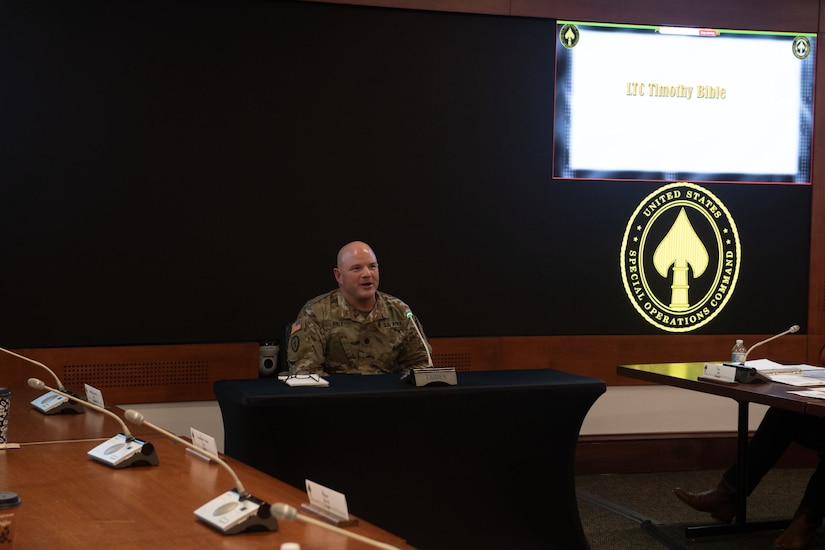Pentagon Caught Flat-Footed on Trump's Bombshell Proposal to Seize Gaza, Potentially with US Troops

After President Donald Trump's announcement Tuesday that he was prepared to use U.S. military forces in Gaza, the Pentagon appeared to once again be caught off guard by the change in policy, and officials were unable to offer any details or confirm any planning.
"The U.S. will take over the Gaza Strip, and we will do a job with it, too," Trump told reporters at a news conference Tuesday evening alongside Israeli Prime Minister Benjamin Netanyahu. He vowed to turn the territory that two million Palestinians call home into "the Riviera of the Middle East."
Trump didn't rule out using U.S. troops to accomplish that goal when asked by reporters, and Defense Secretary Pete Hegseth told reporters Wednesday[1] that he was "prepared to look at all options."
Read Next: Elon Musk Aide Is Now Working at VA and Accessing Its Computer Systems[2]
White House press secretary Karoline Leavitt on Wednesday also called Trump's plan historic, "outside-of-the-box" thinking while also not ruling out the use of U.S. troops. She said Trump had not committed to putting "boots on the ground."
Meanwhile, when several military officials within the Pentagon were asked by Military.com about any plans, they were not prepared to offer any details.
One official said they were unaware of any plans being drawn up, before adding a phrase that is so often repeated that it has become cliche within the walls of the Pentagon: "We are a planning organization, though."
Hegseth commented to reporters on Wednesday but provided no new details on any military planning for Gaza.
"The president is involved in very complex and high-level negotiations of great consequence to both the United States and the state of Israel, and we look forward to working with our allies, our counterparts, both diplomatically and militarily, to look at all options," Hegseth said.
"We certainly would not get ahead of the president or provide details about what we may or may not do," he said.
In fact, Pentagon officials have spent most of the early days of Trump's second term reacting to executive orders or policy announcements that they would learn about at the same time as the public.
The military had to scramble to push troops to the southern border[3] after Trump ordered their involvement, and officials then had no details to offer when Trump and Hegseth said military strikes inside Mexico were on the table[4].
Officials weren't ready to say how they would detain nearly 30,000 migrants in Guantanamo Bay[5] in the days after Trump said he wanted to use the remote base in Cuba for his deportation efforts. The Pentagon also had no ready plan to allow troops who were booted for refusing the COVID-19 vaccine to return to service with back pay when that order was signed.
Experts have already[6] chimed in and noted[7] that Trump's plan to forcibly remove the Palestinians in Gaza, seize control of the land and redevelop it would be a colossal logistical and financial challenge that could easily trigger a new wave of violence and conflict.
Plus, there doesn't appear to be any legal authority that would allow the U.S. to seize control of Gaza, and removing its entire population would violate international law.
Saudi Arabia[8], as well as Turkey and Egypt[9], also issued statements overnight condemning the plan.
Trump's bombshell announcement that he intends the U.S. to take control of one of the most volatile areas in the world comes after him campaigning on keeping the U.S. out of foreign wars.
The U.S. military was involved in wars in Iraq and Afghanistan for two decades, efforts that included holding territory and building up local areas, similar to what the president proposed on Tuesday.
The eagerness to involve the U.S. military in Gaza is also a sharp departure from the position that many Republicans took less than a year ago when they criticized President Joe Biden's plan to use an Army[10] mobile pier system to deliver aid to the war-stricken region.
In April, as the pier was being set up, a mortar attack on the area[11] led Sen. Roger Wicker, R-Miss., the highest-ranking Republican on the Senate Armed Services Committee, to release a statement saying that[12], "Biden should never have put our men and women in this position, and he should abandon this project immediately before any U.S. troops are injured" and that "the risk to Americans will only intensify."
No troops were injured.
Then, after a few disappointing months of operation[13], Rep. Mike Rogers, R-Ala., the Republican lawmaker who leads the House Armed Services Committee, wrote to the Biden administration and called for an end to the mission[14], citing among other reasons the fact that three service members were injured in the effort.
The injuries occurred at sea, because the Biden administration was firm on the fact that no U.S. troops would set foot in Gaza.
Related: First 10 Migrants Arrive at Guantanamo Bay and Will Be Held in Terrorist Prison[15]
© Copyright 2025 Military.com. All rights reserved. This article may not be republished, rebroadcast, rewritten or otherwise distributed without written permission. To reprint or license this article or any content from Military.com, please submit your request here[16].
 When America's favorite groundhog, Punxsutawney Phil, emerged from his cozy burrow at Gobbler's Knob, Feb. 2, 2025, he saw his shadow, and according to legend, that means we're in for six more weeks of winter.
Many Americans associate Groundhog Day with
When America's favorite groundhog, Punxsutawney Phil, emerged from his cozy burrow at Gobbler's Knob, Feb. 2, 2025, he saw his shadow, and according to legend, that means we're in for six more weeks of winter.
Many Americans associate Groundhog Day with
 Army Capt. Timothy Bible stared hopelessly at the beige ceiling tiles and fluorescent lights above his hospital bed at Walter Reed National Military Medical Center in Bethesda, Maryland. It was January 2010, more than a month since his leg was amputated
Army Capt. Timothy Bible stared hopelessly at the beige ceiling tiles and fluorescent lights above his hospital bed at Walter Reed National Military Medical Center in Bethesda, Maryland. It was January 2010, more than a month since his leg was amputated